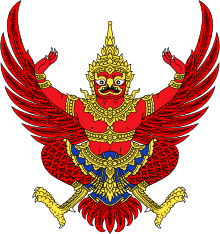National Office of Buddhism
| สำนักงานพระพุทธศาสนาแห่งชาติ | |
| Agency overview | |
|---|---|
| Formed | 3 October 2002 |
| Jurisdiction | Thailand |
| Headquarters | Phutthamonthon, Nakhon Pathom, Thailand |
| Agency executive |
|
| Parent agency | Office of the Prime Minister |
| Website |
www |
The National Office of Buddhism (Thai: สำนักงานพระพุทธศาสนาแห่งชาติ; RTGS: Samnak-ngan Phraphutthasatsana Haeng Chat), also known as Office of National Buddhism (ONaB), is an agency of the central government of Thailand. It is an independent public agency, reporting directly to the prime minister. The National Office of Buddhism is responsible for state administration of the religion. Religious affairs are handled by a Sangha Supreme Council of monks.[1]
ONaB, together with the Sangha, sponsors Thailand's overseas Buddhist missionary policy and activities.[2]
Anti-corruption activities
The head of the National Office of Buddhism, Pongporn Pramsaneh, a former policeman who joined the organization in February 2017, vowed to reform Thailand's 37,075 temples by forcing them to open their financial accounts to the public. The temples receive an estimated US$3.5 billion a year in donations.[3] The government provides a further 4.67 billion baht (US$137 million) to support temples and their more than 300,000 monks.[4] In August 2017 Pongporn was dismissed from his position after Buddhist groups called on the government to sack him over his plans to clean up monasteries.[1] In September 2017 Pongporn was reinstated.[5] His reinstatement followed a police decision to bring charges against four senior monks in connection with temple funds embezzlement.[6] The alleged wrongdoings have since broadened to include officials of the National Office of Buddhism who are alleged to have worked with senior monks in charge of at least 45 temples in Bangkok and other provinces to embezzle more than 270 million baht in state funding.[7] As of April 2018 at least one Thai Buddhist organization is again calling for Pongporn's ouster, claiming that, "...laymen did not have the power to rule over monks."[8] There are signs, however, of growing opposition to clerical independence. As an editorial in the Bangkok Post put it, "...temple donations must be transparent and open to independent auditing. The government must also make temples stand on their own feet. No more financial support; no more privileges."[3]
References
- 1 2 Tanakasempipat, Patpicha; Niyomyat, Aukkarapon (2017-08-30). "Thailand's Buddhism chief removed after pressure from religious groups". Reuters. Retrieved 27 April 2018.
- ↑ Kitiarsa, Pattana (2010-04-30). "Missionary Intent and Monastic Networks: Thai Buddhism as a Transnational Religion". Sojourn: Journal of Social Issues in Southeast Asia. 25 (1): 109–132. ISSN 1793-2858.
- 1 2 Ekachai, Sanitsuda (27 April 2018). "Defrocking bad monks just part of reform" (Editorial). Bangkok Post. Retrieved 27 April 2018.
- ↑ Thepgumpanat, Panarat; Tanakasempipat, Patpicha (2017-06-16). "Thai junta seeks to force temples to open their finances". Reuters. Retrieved 27 April 2018.
- ↑ Sattaburuth, Aekarach (2017-09-26). "Buddhism office chief reinstated". Bangkok Post. Retrieved 27 April 2018.
- ↑ Ngamkham, Wassayos (2017-09-26). "Graft scandal snares 4 senior monks". Bangkok Post. Retrieved 27 April 2018.
- ↑ "The mess some monks create" (Editorial). The Nation. 2018-04-26. Retrieved 27 April 2018.
- ↑ "Buddhist group calls for Pongporn to quit over case of monks' alleged fraud". The Nation. 25 April 2018. Retrieved 27 April 2018.
